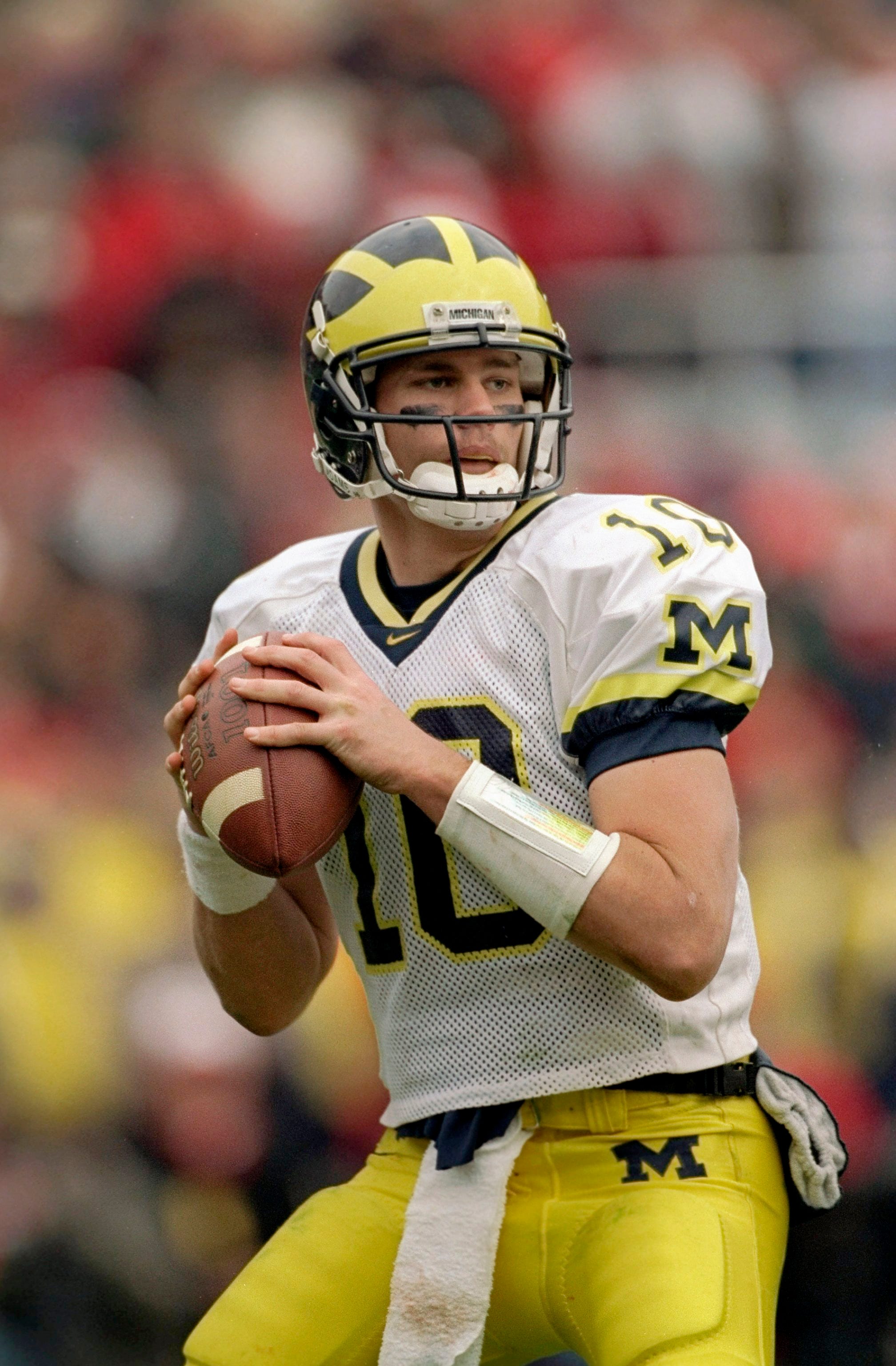Tom Brady says he learned to be 'all about the team' at Michigan
 Angelique S. Chengelis
Angelique S. ChengelisFormer Michigan quarterback Tom Brady, a six-time Super Bowl champion with the Patriots and four-time Super Bowl MVP, said his experience with the Wolverines taught him about being “all about the team.”

He appeared on the The Howard Stern Show Wednesday, and during the lengthy interview on Sirius XM, shared insights into his Michigan experience. Brady highlighted his relationship with Greg Harden, Michigan executive associate athletic director for athletic counseling, as pivotal in adjusting his mindset and approach to the game and life.
Brady was taken in the sixth round of the 2000 draft, the 199th overall pick, by the Patriots. Brady, who described himself as a “late bloomer” coming out of high school in northern California, wanted to prove coach Bill Belichick, also in his first year with the Patriots, had made the right move selecting him
“I was really, really ready and eager to prove myself, because of my college experience, I’d actually learned a lot about competition, about teamwork, about all the things to me that really mattered, and I was ready to go all in on the professional level,” Brady said on the Stern show.
“I came in with an attitude that I could bring a lot to the team, and I was all about the team because that’s what I had learned in college.”
More: Subway owner and ex-Wolverine Cory Zirbel delivers a dose of normalcy to front-line workers
Brady was recruited to Michigan by then-head coach Gary Moeller and defensive backs coach Billy Harris. Things unraveled quickly before Brady arrived for his freshman year.
“I went to Michigan, right, and when I went to Michigan, the head coach that recruited me, he ended up getting fired before I even got to the school,” Brady said on the show. “I committed in the spring, but by the time I got there in the fall, they had fired him. And then the guy who recruited me, he left to go from Michigan to Stanford before I even stepped on the campus.
“So within four months of me committing and going there, the head coach who recruited me, he was gone, the recruiting coordinator who recruited me, he was gone. As it shook out in college, what I realized, when you’re not their guy, there’s a different dynamic. When I got to the Patriots and Coach Belichick had drafted me, I was his guy. When you’re their guy, they want you to succeed, too.”
Lloyd Carr took over as Michigan head coach after Moeller was fired. As a sophomore, Brady met with Carr to discuss transferring.
“My second year, and the guy who was playing above me, Scott Dreisbach, he was very much their guy,” Brady said. “I thought we had got off to kind of a good start, he had got off to a good start in his career, and I was looking up at all these guys on the depth chart that were ahead of me, and I thought, ‘I’m never going to get a chance here.’ I remember talking to the people at Cal, because that was my second choice, to go to Berkeley, and I was thinking, ‘Maybe I should go there, because I’ll get more of an opportunity to play.’
“I went in and talked to Lloyd Carr. I said, ‘I don’t really think I’m going to get my chance here, I think I should leave,’ and he said, ‘Tom, I want you to stay, and I believe in you and I think you could be a good player, but you’ve got to start worrying about the things you can control.’ When he said that he wanted me there, I went to bed that night, I woke up the next day, and I figured, you know what, if I’m going to be – and I still feel this way today – in a team sport, you’ve got to sacrifice what you want individually for what’s best for the team. So if you’re not the best guy, it’s a disservice for the team if you’re forced to somehow play. My feeling was, if I’m going to be the best, I’ve got to beat out the best and if the best competition’s at Michigan, I’ve got to beat those guys out if I’m going to play. I ended up committing to be the best.”
It was at that time that Brady sought out Harden, who has often been referred to as “Michigan’s secret weapon,” an individual credited by many of UM’s finest athletes as having given them focus and direction when they needed it most.

“I started working with a psychologist, who was really an amazing influence on my life and really – it’s a little emotional, because it was a very vulnerable time in my life where I was kind of questioning who I was because I had gone from California to Michigan,” Brady said. “I was a long way from home, so it was a different environment, and his name was Greg Harden. He helped me grow up from this kid in California to really being more of a man and being more on my own and taking more personal responsibility for my life, because he wasn’t gonna let me just be a victim in that situation.
“He became one of my great friends. It was just a big shift in my mind from me complaining all the time that I wasn’t getting what I wanted to stop complaining and do something about it.”
Brady said the important messages Harden gave him helped him become a better player and teammate.
“It was, if they only give you three repetitions in practice, do the best you can with those three,” he said. “If you do well with those three, they’ll give you five. If you do well with those five, they’ll give you 10. If you do well with those 10, they’ll give you 20. Well, I would only complain that I got three, how could I prove myself if this guy’s getting 30 and I’m getting three. Finally, I started doing great with those three, and I did great with those five, and I did great with those 10, then I ended up being the guy who was getting 30, and the other guys were getting three."
The two men still speak on occasion, Brady said. What he learned from him at Michigan is very much part of who he is now and explained how that has been incorporated in his professional career. Brady used Super Bowl LI as an example when the Patriots were down 28-3 to Atlanta.
“You could look at that situation and basically quit and say ‘(Expletive) it, we have no shot of winning,’” Brady said. “Or you can say, ‘This is going to be an amazing comeback. When we come back from this, this is going to be the defining moment of our life or a defining moment in a professional career.’ When you shift your mind to think that way, it becomes very empowering as opposed to very discouraging. Any time we’re down in a game, I think, ‘Man, if we come back and win this game, we’re the hero, rather than, “Oh, (expletive), we’re screwed. We got no shot.’”
The Patriots' 25-point comeback is the largest in Super Bowl history, as they won, 34-28 in overtime in 2017.